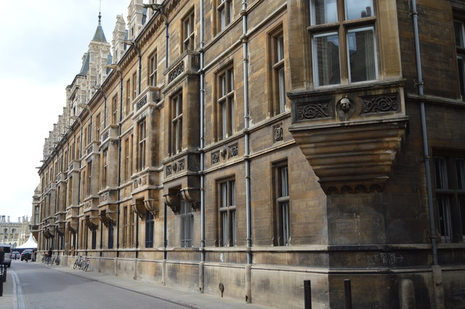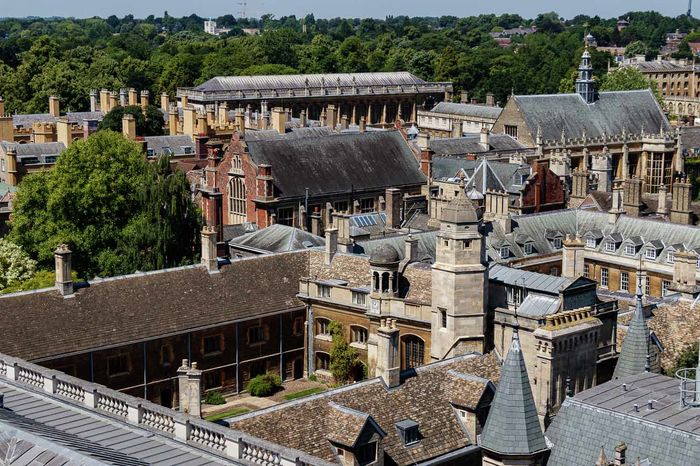Gonville and Caius release preliminary report on their legacies of slavery
The interim report finds little evidence that the College benefitted from the proceeds of the slave trade

Gonville and Caius College released a report on Thursday (11/03) on their “Research Project Looking into the Legacies of Slavery and Coerced Labour at Gonville & Caius College” which details the findings of a brief study of the college archives in July 2019.
The research was conducted by an undergraduate History student over five days in the College archives. The aim was “to use the Caius archives as well as primary and secondary materials to begin preliminary research for the College’s project looking into the legacies of slavery and coerced labour”.
In the report, the student concludes that they found little evidence of college links to the slave trade, though does note that this finding is preliminary, based on limited time and study using the archives.
“The overall message of this research should be that there were certainly Caians who benefitted significantly from the slave trade after they left the college, but that there is little evidence to suggest that the college profited from their deeds by proxy of donation, as benefactions tended to come predominantly from former fellows (who were unlikely to have any connections to slavery or coerced labour).”
The research was conducted using several methodologies including online databases and college archives to investigate the connections of students and staff to the slave trade, and any donations to the college by people who profited from the slave trade. The primary sources of information were the UCL Legacies of British Slave-ownership database and ‘The Biographical History of Gonville and Caius College’ compiled by John Venn, which holds historical records of Caius staff and students.
Searches of the UCL database identified 10 Caians who had received compensation from the Slavery Compensation Commission (SCC), which distributed a total of £20 million to slaveowners after the Slavery Abolition Act 1833. The report also notes that those individuals generally received higher sums of money from this commission than average, with one claimant from Caius receiving over £10,000. However, there was no indication that any of these individuals donated money to the college.
The second approach, cross-referencing biographies in Venn’s book with the Oxford Dictionary of National Biography “showed no people who were obviously affiliated with slavery and coerced labour”, though this could not be certain: “though this exercise showed no people who were obviously affiliated with slavery and coerced labour, it remains possible that some donors and benefactors were.”
The report also includes comments from a fellow at the College, looking further into the cases of three of the Caians identified as having possible links to the slave trade in the main body of the report. The fellow states that two of the 10 Caians deemed to have received compensation from the SCC should be removed from the tally, given that greater research reveals they did not directly benefit from that compensation.
One of the college benefactors, Bartholomew Wortley, is said to have “owned South Sea Company stocks and annuities and that these were given to Caius College”. The South Sea Company was granted a trade monopoly with Spanish colonies in South America, and at the centre of the South Sea Bubble in 1720.
A note in the report states that this connection will be examined further in future research, and the fellow casts doubt on the implications relevance of this information, writing “I am confident that the College never invested in South Sea Company shares or trading stock, and it seems highly doubtful whether Wortley [...] would have done so either. ” They also note the College’s early support for the Society for the Abolition of the Slave Trade.
The fellow clarifies that there were two streams of capital of the South Sea Company following the burst of the bubble, suggesting that the stocks in question were South Sea Annuities, which returned annual interest and were not associated with profit from the company’s trading.
As this is an interim report, a limited time was dedicated to research in the Caius archives and online databases: the report notes in particular that the Bursars’ Books, which are extremely detailed, would require a longer period of study. The Working Group on Legacies of Slavery, which supervised the student who produced this report, are continuing their research into the Caius archives, employing a postdoctoral researcher “to investigate ay further connections”, the results of which will also be published.
The research project was launched in July 2019, after the University announced in April that they would “conduct an in-depth academic study into ways in which it contributed to, benefited from or challenged the Atlantic slave trade and other forms of coerced labour during the colonial era.” The initial report of the University’s cross-disciplinary Advisory Group on Legacies of Enslavement was released last year.
Sixteen colleges committed to collaboration with the University project in June 2019, opening their archives to two post-doctoral researchers, who are due to finish their work this summer. Several colleges later announced their own separate investigations into historic links with slavery, including Pembroke College, which announced three bursaries for students to research the College’s links to slavery in March 2020.
 News / Uni Scout and Guide Club affirms trans inclusion 12 December 2025
News / Uni Scout and Guide Club affirms trans inclusion 12 December 2025 News / Cambridge Vet School gets lifeline year to stay accredited28 November 2025
News / Cambridge Vet School gets lifeline year to stay accredited28 November 2025 Science / Did your ex trip on King’s Parade? The science behind the ‘ick’12 December 2025
Science / Did your ex trip on King’s Parade? The science behind the ‘ick’12 December 2025 News / Cambridge study finds students learn better with notes than AI13 December 2025
News / Cambridge study finds students learn better with notes than AI13 December 2025 News / Pembroke to convert listed office building into accom9 December 2025
News / Pembroke to convert listed office building into accom9 December 2025








